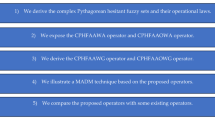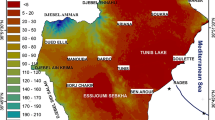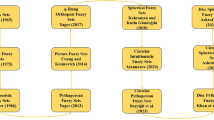Abstract
Multi-criteria group decision-making (MCGDM) is an approach to tackle different decision-making situations, where the criteria that drive the decision are considered by different experts. Research regarding MCGDM is quite challenging due to both the structure of the problem and the existence of complex uncertain information. The goal of this article is to produce a new MCGDM model which covers criteria evaluation by different experts. A novel hybrid model called m-polar fuzzy soft expert sets is developed by the combination of m-polar fuzzy sets with soft expert sets; thus, it investigates soft expert sets in the m-polar fuzzy environment. The characteristics of this hybrid model are explored with the aid of numerical examples. Further, its basic properties are investigated, and the operations of subsethood, complement, intersection, union, plus the OR and AND operators are introduced. Two well-known real-world problems are solved with the developed hybrid model, namely site selection for a dam and human trafficking analysis for different countries. The algorithm of the proposed model proves its efficiency and cogency. A comparison of the developed model with existing mathematical methods is provided.

Similar content being viewed by others
References
Hwang CL, Lin MJ (1987) Group decision making under multiple criteria: methods and applications. Springer, Berlin
Yager RR (1993) Non-numeric multi-criteria multi-person decision making. Group Decis Negot 2(1):81–93
Akram M, Ilyas F, Garg H (2020) Multi-criteria group decision making based on ELECTRE I method in Pythagorean fuzzy information. Soft Comput. 24(5):3425–3453
Akram M, Al-Kenani AN (2020) Multi-criteria group decision-making for selection of green suppliers under bipolar fuzzy PROMETHEE process. Symmetry 12(1):77
Chapman DS, Webster J (2003) The use of technologies in the recruiting, screening, and selection processes for job candidates. Int J Sel Assess 11(2–3):113–120
Ma X, Akram M, Zahid K, Alcantud JCR (2020) Group decision-making framework using complex Pythagorean fuzzy information. Neural Comput Appl. https://doi.org/10.1007/s00521-020-05100-5
Krishankumar R, Ravichandran KS, Shyam V, Sneha SV, Kar S, Garg H (2020) Multi-attribute group decision-making using double hierarchy hesitant fuzzy linguistic preference information. Neural Comput Appl 32:14031–14045
Chen S-M, Cheng S-H, Chiou C-H (2016) Fuzzy multiattribute group decision making based on intuitionistic fuzzy sets and evidential reasoning methodology. Inf Fusion 27:215–227
Zhan J, Alcantud JCR (2019) A novel type of soft rough covering and its application to multicriteria group decision making. Artif Intell Rev 52:2381–2410
Zhang Y, Xu Z, Liao H (2017) A consensus process for group decision making with probabilistic linguistic preference relations. Inf Sci 414:260–275
Zhang H, Jia-Hua D, Yan C (2020) Multi-attribute group decision-making methods based on Pythagorean fuzzy \(N\)-soft sets. IEEE Access 8:62298–62309
Zadeh LA (1965) Fuzzy sets. Inf Control 8(3):338–353
Krzywanski J (2019) Heat transfer performance in a superheater of an industrial CFBC using fuzzy logic-based methods. Entropy 21(10):919. https://doi.org/10.3390/e21100919
Sosnowski M, Krzywanski J, Scurek R (2019) A fuzzy logic approach for the reduction of mesh-induced error in CFD analysis: a case study of an impinging jet. Entropy 21(11):1047. https://doi.org/10.3390/e21111047
Krzywanski J, Grabowska K, Sosnowski M, Zylka A, Sztekler K, Kalawa W, Wojcik T, Nowak W (2019) An adaptive neuro-fuzzy model of a re-heat two-stage adsorption chiller. Therm Sci 23(4):1053–1063
Sahu A, Patel US (2017) Modelling and simulation of fuzzy logic based controller for energy storage system. J Electron Des Technol 8(2):9–15
Teodorescu HNL, Kandel A, Jain LC (2017) Fuzzy logic and neuro-fuzzy systems in medicine and bio-medical engineering: a historical perspective. CRC Press, Boca Raton. https://doi.org/10.1201/9780203713419
Alcantud JCR, Biondo AE, Giarlotta A (2018) Fuzzy politics I: the genesis of parties. Fuzzy Sets Syst 349:71–98
Alcantud JCR, Calle RA (2017) The problem of collective identity in a fuzzy environment. Fuzzy Sets Syst 315:57–75
Arqub OA, Al-Smadi M (2020) Fuzzy conformable fractional differential equations: novel extended approach and new numerical solutions. Soft Comput 24:12501–12522
Arqub OA, Al-Smadi M, Momani S, Hayat T (2016) Numerical solutions of fuzzy differential equations using reproducing kernel Hilbert space method. Soft Comput 20:3283–3302
Arqub OA, Al-Smadi M, Momani S, Hayat T (2017) Application of reproducing kernel algorithm for solving second-order, two-point fuzzy boundary value problems. Soft Comput 21(23):7191–7206
Arqub OA (2017) Adaptation of reproducing kernel algorithm for solving fuzzy Fredholm–Volterra integrodifferential equations. Neural Comput Appl 28(7):1591–1610
Alcantud JCR, Rambaud SC, Torrecillas MJM (2017) Valuation fuzzy soft sets: a flexible fuzzy soft set based decision making procedure for the valuation of assets. Symmetry 9(11):253
Zhang W-R (1998) Bipolar fuzzy sets. In: Proceedings of FUZZ-IEEE 835–840
Chen J, Li S, Ma S, Wang X (2014) \(m\)-Polar fuzzy sets: an extension of bipolar fuzzy sets. Sci World J 2014:8
Zhang X, Xu Z (2014) Extension of TOPSIS to multiple criteria decision making with Pythagorean fuzzy sets. Int J Intell Syst 29:1061–1078
Waseem N, Akram M, Alcantud JCR (2019) Multi-attribute decision-making based on \(m\)-polar fuzzy Hamacher aggregation operators. Symmetry 12:1498. https://doi.org/10.3390/sym11121498
Liu C, Tang G, Liu P (2017) An approach to multicriteria group decision-making with unknown weight information based on Pythagorean fuzzy uncertain linguistic aggregation operators. Math Probl Eng 2017:18
Molodtsov DA (1999) Soft set theory-first results. Comput Mathe Appl 37(4–5):19–31
Pawlak Z (1982) Rough sets. Int J Comput Inf Sci 11(5):145–172
Feng F, Li CX, Davvaz B, Ali MI (2010) Soft sets combined with fuzzy sets and rough sets: a tentative approach. Soft Comput 14(9):899–911
Feng F, Li Y (2013) Soft subsets and soft product operations. Inf Sci 232:44–57
Meng D, Zhang H, Qin K (2011) Soft rough fuzzy sets and soft fuzzy rough sets. Comput Math Appl 12:4635–4645
Alcantud JCR, Santos-García G, Galilea EH (2015) Glaucoma diagnosis: a soft set based decision making procedure. In: Puerta JM, Gámez JA, Dorronsoro B, Barrenechea E, Troncoso A, Baruque B, Galar M (eds) Advances in artificial intelligence, LNCS, vol 9422. Springer, Berlin, pp 49–60
Maji PK, Biswas R, Roy AR (2003) Soft set theory. Comput Math Appl 45(4–5):555–562
Ali MI, Feng F, Liu XY, Min WK, Shabir M (2009) On some new operations in soft set theory. Comput Math Appl 57(9):1547–1553
Maji PK, Roy AR, Biswas R (2002) An application of soft sets in a decision-making problem. Comput Math Appl 44(8):1077–1083
Maji PK, Biswas R, Roy AR (2001) Fuzzy soft sets. J Fuzzy Math 9(3):589–602
Akram M, Ali G, Waseem N, Davvaz B (2018) Decision-making methods based on hybrid \(m\)F models. J Intell Fuzzy Syst 35(3):3387–3403
Fatimah F, Rosadi D, Hakim RBF, Alcantud JCR (2018) \(N\)-Soft sets and their decision making algorithms. Soft Comput 22(12):3829–3842
Ali G, Akram M (2020) Decision-making method based on fuzzy \(N\)-soft expert sets. Arab J Sci Eng 45(12):10381–10400
Akram M, Ali G, Alshehri NO (2017) A new multi-attribute decision-making method based on \(m\)-polar fuzzy soft rough sets. Symmetry 9(11):271
Mathew TJ, Sherly E, Alcantud JCR (2018) A multimodal adaptive approach on soft set based diagnostic risk prediction system. J Intell Fuzzy Syst 34(3):1609–1618
Alkhazaleh S, Salleh AR (2011) Soft expert sets. Adv Decis Sci 2011:12. https://doi.org/10.1155/2011/757868
Alkhazaleh S, Salleh AR (2014) Fuzzy soft expert set and its application. Appl Math 5(09):1349–1368
Adam F, Hassan N (2016) Multi Q-fuzzy soft expert set and its application. J Intell Fuzzy Syst 30(2):943–950
Al-Qudah Y, Hassan N (2017) Bipolar fuzzy soft expert set and its application in decision making. Int J Appl Decis Sci 10(2):175–191
Bashir M, Salleh AR (2012) Fuzzy parameterized soft expert set. Abstr Appl Anal 2012:15. https://doi.org/10.1155/2012/404325
Bashir M, Salleh AR (2012) Possibility fuzzy soft expert set. Open J Appl Sci 12:208–211
Broumi S, Smarandache F (2015) Intuitionistic fuzzy soft expert sets and its application in decision making. J New Theory 1:89–105
Qayyum A, Abdullah S, Aslam M (2016) Cubic soft expert sets and their application in decision making. J Intell Fuzzy Syst 31(3):1585–1596
Hassan N, Alhazaymeh K (2013) Vague soft expert set theory. AIP Conf Proc 1522(1):953–958
Ali G (2019) Decision-making methods based on \(m\)-polar fuzzy \(N\)-soft rough sets (PhD Thesis), University of the Punjab, HEC
Ali MI (2011) A note on soft sets, rough soft sets and fuzzy soft sets. Appl Soft Comput 11(4):3329–3332
Alkhazaleh S, Salleh AR, Hassan N (2011) Possibility fuzzy soft set. Adv Decis Sci 2011:18. https://doi.org/10.1155/2011/479756
Ali G, Akram M, Alcantud JCR (2020) Attributes reductions of bipolar fuzzy relation decision systems. Neural Comput Appl 32:10051–10071
Arockiarani I, ArokiaLancy AA (2013) Multi criteria decision making problem with soft expert set. Int J Comput Appl 78(15):1–4
Ibrar M, Khan A, Khan S, Abbas F (2019) Fuzzy parameterized bipolar fuzzy soft expert set and its application in decision making. Int J Fuzzy Log Intell Syst 19(4):234–241
Ma X, Liu Q, Zhan J (2017) A survey of decision making methods based on certain hybrid soft set models. Artif Intell Rev 47:507–530
Akram M, Luqman A, Alcantud JCR (2020) Risk evaluation in failure modes and effects analysis: hybrid TOPSIS and ELECTRE I solutions with Pythagorean fuzzy information. Neural Comput Appl. https://doi.org/10.1007/s00521-020-05350-3
Yang ZL, Garg H, Li J, Srivastava G, Cao Z (2020) Investigation of multiple heterogeneous relationships using a q-rung orthopair fuzzy multi-criteria decision algorithm. Neural Comput Appl. https://doi.org/10.1007/s00521-020-05003-5
Funding
J.C.R. Alcantud is grateful to the Junta de Castilla y León and the European Regional Development Fund (Grant CLU-2019-03) for the financial support to the Research Unit of Excellence ‘Economic Management for Sustainability’ (GECOS).
Author information
Authors and Affiliations
Corresponding author
Ethics declarations
Conflicts of interest
The authors declare no conflicts of interest.
Additional information
Publisher's Note
Springer Nature remains neutral with regard to jurisdictional claims in published maps and institutional affiliations.
Rights and permissions
About this article
Cite this article
Akram, M., Ali, G., Butt, M.A. et al. Novel MCGDM analysis under m-polar fuzzy soft expert sets. Neural Comput & Applic 33, 12051–12071 (2021). https://doi.org/10.1007/s00521-021-05850-w
Received:
Accepted:
Published:
Issue Date:
DOI: https://doi.org/10.1007/s00521-021-05850-w




